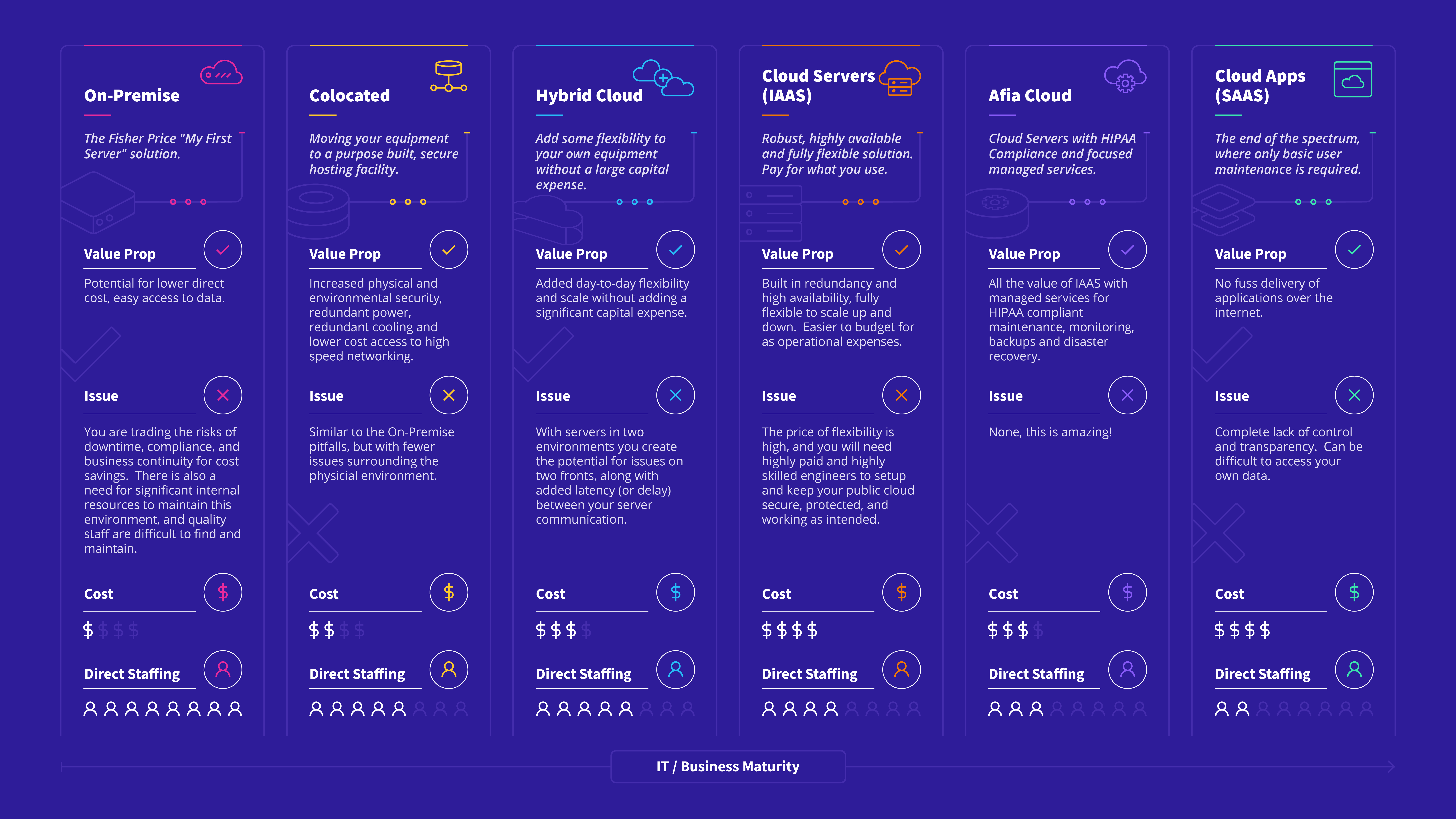An optimized IT infrastructure is important to create efficiencies and scale for the modern behavioral health organization. Advancements in cloud technology have created opportunities for progress, so we've put together a guide to walk you through the basics of "the cloud."
An Introduction to the Cloud in Healthcare
Is the Cloud Right for your Organization?
Protecting your Organization and Cloud Security
“The Cloud” has been one of the biggest buzzwords in healthcare over the past 3-5 years, but for many organizations there are still as many questions as answers. One of the reasons for this is that people use the term “cloud” to mean many different things. A simple way to understand the cloud is that it is a way to make computer systems, applications, and data available over the internet. And while it started as a way for organizations to store some simple data, it has now become a strategic mechanism that many use to gain efficiencies, manage costs, and extend their IT resources. According to a recent HIMSS Analytics Survey, over 83 percent of healthcare organizations are already using cloud technology, and that is expected to reach a value well above 90% by 2020.
A concept that we stress with healthcare organizations is that before decisions are made about moving their IT infrastructure, there should be a strategic IT plan in place. By defining an organizational IT strategy, there is assurance of better alignment between IT and the overarching business needs and goals. This creates a path to understand what new programs, services, and systems may be coming on the horizon, what the budgetary constraints may be, and the IT resources that will be needed to deliver on these needs. An IT infrastructure analysis is a great way to audit each piece of the IT puzzle, identifying potential gaps or weaknesses that can be solved in the future.
There are many different options for hosting your IT infrastructure (see chart below). In the past, many healthcare organizations centralized their hardware in their own physical facilities. The main reasons for this was the sense of security and control that it provided IT leadership, along with a lower direct cost. As technology advanced, and costs decreased, it became more common to move hardware to colocated data centers or create hybrids between on-premise hosting and the cloud. Today, the advantages to cloud computing are getting so pronounced that adoption is hitting a tipping point in the healthcare industry. Some of the reasons for this include:

Healthcare IT leadership have viewed cloud computing with quite a bit of skepticism since its inception. Much of this has been driven by the “HIPAA scare” and the need to trust an external entity with protected health information. But now, with constant ransomware attacks and HIPAA breaches, organizations are realizing that their business continuity practices aren’t nearly as good as they should be. IT staff are too busy putting out fires and aren’t taking care of the blocking and tackling (updates and patches) that is so important with servers and other hardware.
By leveraging managed services with a cloud provider, organizations can feel more secure because expert staff will handle the updates, patches, backups, and disaster recovery solutions for their organization. And as long as the cloud provider is familiar with healthcare practice, they’ll do all of this within the confines of HIPAA rules and regulations.
Today’s healthcare organizations have to focus on a lot more than the health of their clients. The infrastructure it takes to support clinical care delivery continues to expand, with Information Technology being one of the most significant contributors to that growth. As companies have become more dependent on technology for their clinical, administrative, and financial […]
Some businesses are concerned about exactly how to choose the right cloud applications, how to get the best use from them, and if their data will be secure when it’s up there. The cloud certainly does raise a lot of questions: What is the cloud, anyway? What can the cloud do for my business? What […]
The Cloud can have many meanings, but it can also be a powerful tool to help create scalability, flexibility, and transparent costs for healthcare organizations. In our webinar below we explain the basics on the cloud, and illustrate ways the healthcare cloud is well positioned to support behavioral healthcare organizations to better achieve their mission. […]